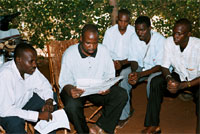
Journalists of CMC in Koutiala ead together the papers in N'KO. Photo by Serge Daniel © UNESCO
At independence in 1960 most newspapers were privately owned organs either of the nationalist political movements and parties or of businesses mostly established by European investors. But by 1970 most newspapers of any significance across the continent were government-owned. Any newspaper expressing independent editorial attitudes was censored, banned or so controlled that most of the owners gave up publishing. One man, the Liberian journalist Kenneth Best, started the first daily in both Liberia and Gambia in the 1980s. Mr. Best eventually had to flee both countries.
Strengthening democracy
Since the 1990s, however, the independent media have grown like the savannah grass after the rain. In West Africa, according to a 2006 study by the UN Economic Commission for Africa, there were over 5000 newspapers and radio and television stations in 15 countries. This media boom accompanying the movement for democratic reforms in Africa, transformed the continent's media landscape virtually overnight. Suddenly the streets of Africa's capitals were awash with newspapers. The "culture of silence," imposed first under colonialism and then by post-colonial military dictatorships and autocratic one-party states, was rudely broken.
By far the most earth-shaking development was the burst of radio stations. In the war-ravaged Democratic Republic of the Congo, for instance, there are about 196 community radio stations. Somalia saw the emergence of its first independent press, radio and even TV after it plunged into continuing anarchy. Across the continent, the Internet and mobile telephony augment old media to expand Africans' sources of information and means of mass communication.
Today, two decades since the media boom, Eritrea is about the only country in sub-Saharan Africa in which government has a total monopoly on press and broadcasting.
Weak though they may often be, the media, especially the independent outlets, have made remarkable contributions to peaceful and transparent elections in Benin, Cape Verde, Ghana, Mali, Namibia, South Africa and Zambia; to post-conflict transitions and the restoration of peace in Liberia, Mozambique and Sierra Leone; and to sustaining constitutional rule in times of political crises in Guinea, Kenya and Nigeria. And many continue to push to open up the space for freedom in suffocating environments.
Continuing repression
This progressive thrust of the media has generally come up against violent repression. When the media have dared to question or uncover criminality and corruption in high places, they have usually earned the extreme wrath of "where power lies."
Thus virtually all assassinations of journalists, such as that of Norbert Zongo in Burkina Faso in 1998, Carlos Cardoso in Mozambique in 2000 or Deyda Heydara in Gambia in 2004, have had similar motives. The report of an independent commission on the Zongo case concluded that "Norbert Zongo was assassinated purely for political reasons, because he practiced committed investigative journalism."
The use of repressive legislation has also been a major tool in reversing the media's freedoms. Outside of South Africa, the new atmosphere of media pluralism elicited very negligible legal and policy reforms. By 2005 legislative and policy frameworks in most countries were so constraining that the ECA said in a study, "The need for a critical review and overhaul of the legal and policy environment in which the media operates across Africa cannot be overstated."
Instead, civil society groups use institutions such as the Special Rapporteur on Freedom of Expression and Access to Information of the African Commission on Human and People's Rights to promote media rights. Some, such as the Media Foundation for West Africa, also use the new regional ECOWAS Community Court of Justice to challenge violations of journalists' rights.
Constraints and limitations - and here to stay
Despite the phenomenal growth of the media, Professor Guy Berger of the Rhodes University School of Journalism and Media Studies in South Africa insisted in 2007 that "Africans are the least-served people of the world in terms of the circulation of information." Of all the constraints and limitations affecting the African press, economic factors appear to be the most critical. Most media outlets remain small operations, with poor business management capacity. A few like the Nation Media Group in Kenya and Multimedia in Ghana have expanded into other media, and extended operations across borders into other countries. But many more face the possibility of shrinkage and perhaps extinction.
As media pluralism grows and African economies open up, the media's growing dependence on the market threatens to limit editorial independence. Businesses that are visibly dominant in advertising and sponsorships are reported by journalists to be exerting pressure on media to do their bidding, such as by killing stories unfavourable to the businesses.
Independent and pluralistic media in Africa are here to stay, however, despite the many challenges. And that may be the guarantee of the growth and strengthening of democracy in Africa.
Article published courtesy of UN/Africa Renewal

















